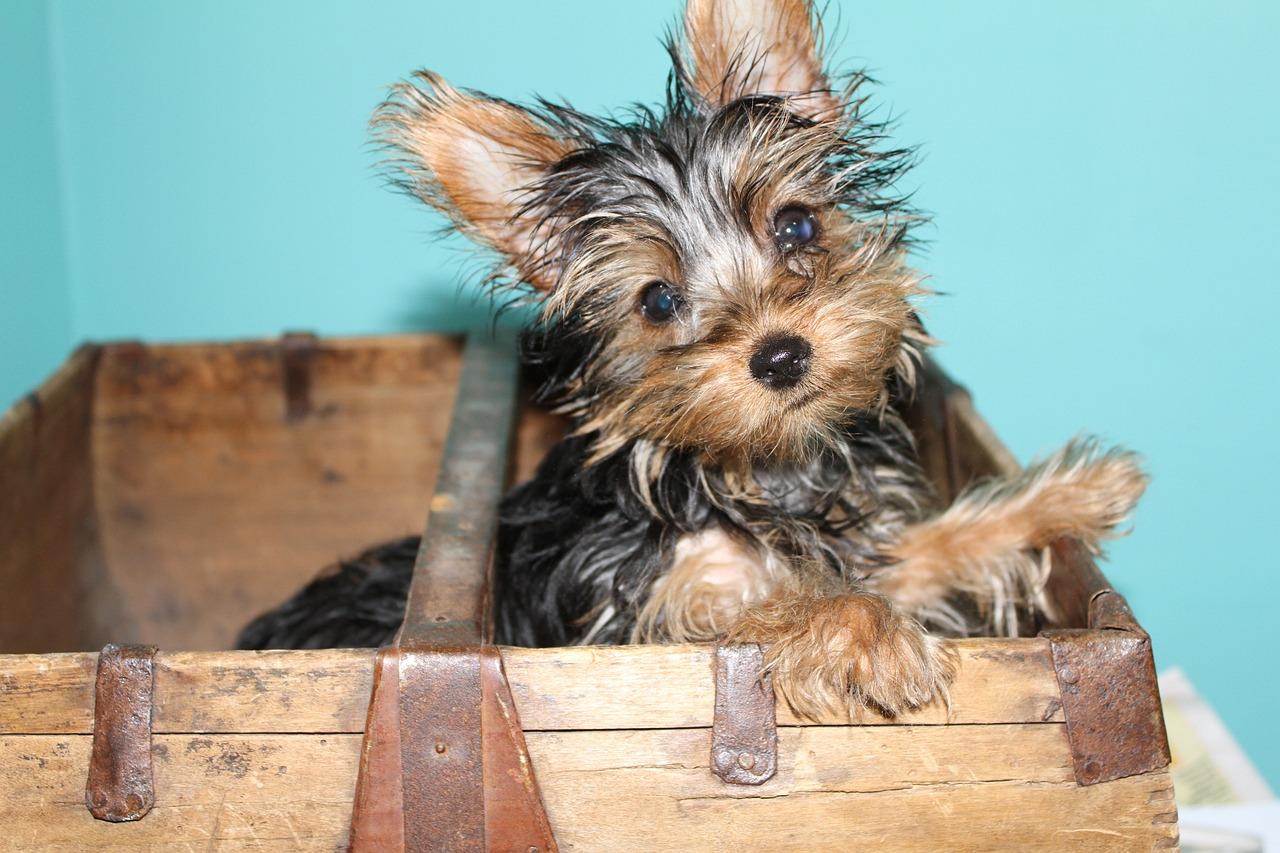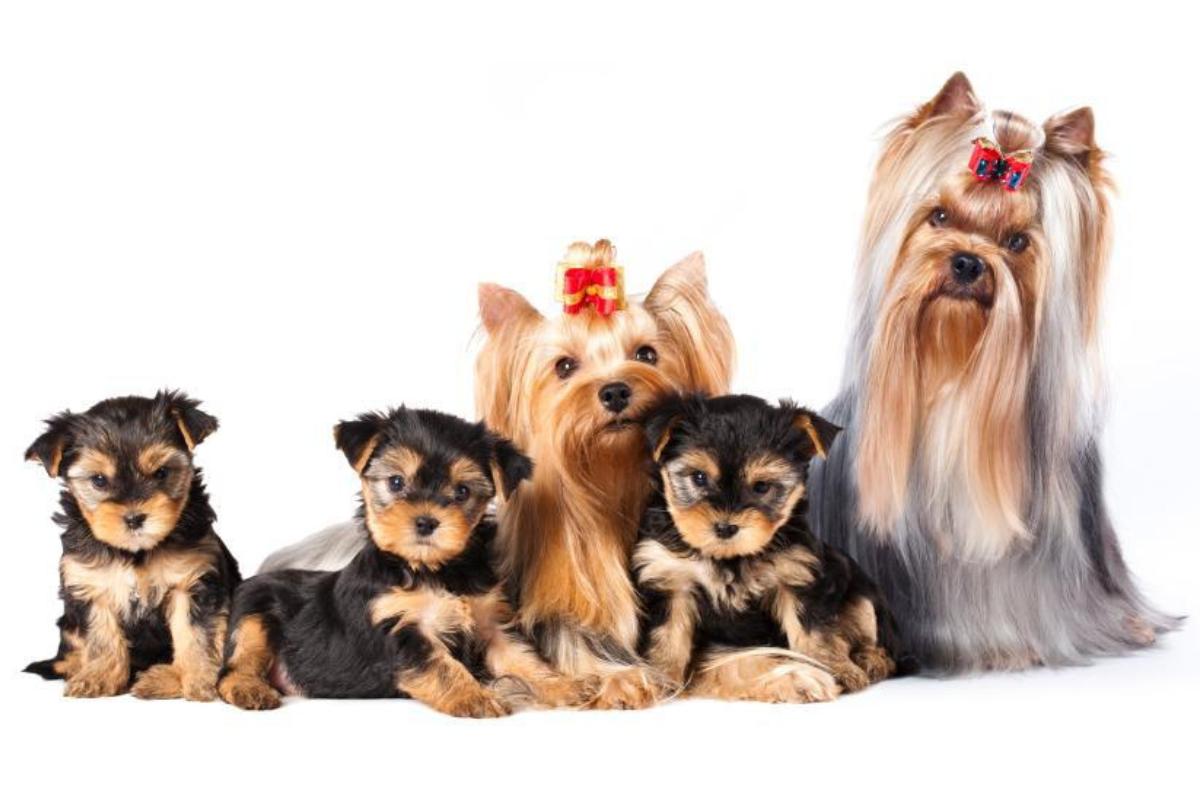How Many Puppies Can a Yorkie Have?



Animal file: Yorkshire terrier
The average litter size of a Yorkshire Terrier is 1-5 puppies. This will depend on various factors related to the individual dog, but breed is a determining factor on how many puppies will be in a dog's litter. Regardless of the litter size, it is important that a pregnant dog be well cared for before, during and after her pregnancy. We also want to stress that you should generally not breed dogs. It takes a certain level of responsibility and resources. There are also too many dogs out there in need of a home already. For this reason, it is best to adopt, not shop.
At AnimalWised, we go into more detail by asking how many puppies can a Yorkie have? In addition to sharing the average litter size of a Yorkshire Terrier, we provide more information on Yorkie pregnancy to ensure the health of mother and puppies.
How many puppies can a Yorkshire terrier have?
The number of puppies a Yorkshire Terrier (Yorkie) can have in a litter can vary, but a normal litter size for a healthy Yorkie typically ranges from 1 to 5 puppies. Yorkies are a small breed, and their size can influence the number of puppies they can comfortably carry and deliver.
It's worth noting that smaller dog breeds tend to have smaller litters compared to larger breeds. This is due to the limited space within the mother's uterus for the development of multiple puppies. Additionally, Yorkies are known for having relatively small pelvic openings, which might affect the ease of delivery.
Yorkies are generally considered a toy breed, and their small size might make them more prone to complications during pregnancy and delivery. Such complications can include dystocia (difficulty giving birth) due to the size of the puppies in relation to the mother's size.
While a normal litter size for a healthy Yorkie can range from 1 to 5 puppies, it's always best to prepare for the possibility of complications or variations. If you're considering breeding Yorkies or any other dog breed, it's recommended to consult with a veterinarian or a professional breeder to ensure you have the necessary knowledge and resources to provide the best care for the mother and her puppies.
Find out what to expect during labor with our article on why a pregnant dog is panting, but not pushing.
What determines the size of a Yorkie's litter?
The number of puppies a Yorkie will have in a litter is influenced by various factors, including both genetic and environmental. While there's no exact formula that predicts the exact number of puppies, these factors collectively play a role in determining litter size of a Yorkshire Terrier:
- Age: younger and older dogs might have smaller litters. Female dogs are typically most fertile between the ages of 2 and 5 years.
- Health: the overall health of the mother dog plays a significant role. Dogs in good health are more likely to have larger litters.
- Size: the size of the dog can influence litter size. Larger dogs might have more space in their uterus for multiple puppies, potentially resulting in larger litters. Learn more about the size of a Yorkie with our article on at what age does a Yorkshire Terrier stop growing?
- Genetics: genetic factors play a role in determining litter size. If a dog's parents had larger litters, there's a higher chance that the dog might also have larger litters.
- Number of eggs released: the number of eggs released during the heat cycle can affect litter size. Some dogs release more eggs, leading to the potential for a larger litter.
- Hormones: hormonal factors can impact fertility and litter size. Hormonal imbalances can affect the release of eggs and the success of implantation.
- Nutrition: proper nutrition before and during pregnancy is crucial. Dogs with nutritional deficiencies might have smaller litters or complications during pregnancy.
- Stress: stress can have a negative impact on fertility and overall reproductive health, potentially affecting litter size.
- Previous litters: a dog's previous litter size might be an indicator of future litter size, although it's not always consistent.
- Breeding timing: successful mating during the optimal time in the female dog's heat cycle increases the chances of fertilization and larger litter size.
It's important to note that while these factors can influence litter size, there's always variation. Some dogs might have smaller or larger litters than expected. Litter size can also be affected by factors like the number of fertilized eggs that successfully implant and develop.
Learn more about what to do when a Yorkie gives birth with our article on whether a male dog can be around newborn puppies.

What to consider before breeding Yorkshire Terriers
To begin with, it's essential to understand some basic details about the parents in order to avoid childbirth complications or future diseases:
- Avoid inbreeding: it's very important for you to understand that the breeding of genetically related animals increases the likelihood of their offspring being affected by recessive genes, causing a genetic deterioration in the offspring. That includes the appearance of mutations, diseases and other health problems.
- Healthy individuals: you should never breed a Yorkshire Terrier that suffers from any degenerative issues or serious health problems. Genetic problems that can be passed on to puppies should be avoided at all costs. The best known ones are osteoarthritis and hip dysplasia.
- Physical defects: before thinking of breeding your dog, you should make sure they don't suffer from any sort of physical defect. For example, a poorly developed jaw can be inherited and be detrimental to the puppy's future development. Some physical defects can be passed on and others can't, but it would be a serious problem if it occurs more intensely in the offspring than in the parent.
- Size of the male: being aware of the size of the male is essential to preventing problems in the pregnancy. You should choose a male that is smaller than the female, so that the puppies are not excessively big and don't cause stress on the uterus. This is a problem for Yorkshire Terriers since they are one of the smallest dog breeds.
- Delivery problems: whether consider the size of the male or not, problems may arise that can cause the puppies or mother to die. Find out about all all the pregnancy problems that can arise and get ready to act or call the vet.
- Responsibility for the puppies: if you've decided to breed your Yorkshire Terrier, you should be very aware that you (along with the other owner) are responsible for the life of these small animals. You can't abandon them or not look after them well enough. Neither should they be given to someone who will not look after them well. Remember that there are millions of abandoned Yorkshire Terriers around the world. If you can't look after them all, it's better for you not to breed your dog.
- Looking after the puppies: puppies can be rejected by the mother, be born ill or develop problems if they are not properly fed. You should make sure you're capable of addressing all of their dietary needs, if this is the case.
- Yorkshire Terrier puppies: Yorkshire Terrier puppies are particularly delicate in terms of pregnancy and labor. Inappropriate care can cause some puppies to die.
- Economic solvency: you must prepare yourself for the possible emergence of a large litter, or for medical complications to arise. Remember that veterinarians, food and baby formula milk are expensive. It is very important for you to consider this before the arrival of the litter of small Yorkshire Terriers.
How to care for a pregnant Yorkie
Caring for a pregnant Yorkshire Terrier requires special attention due to their small size and specific needs. Here's a short synopsis of how to provide proper care for a pregnant Yorkie:
- Preparation: consult with a veterinarian before breeding to ensure your Yorkie is in good health for pregnancy. Obtain necessary health checks and vaccinations.
- Nutrition: feed a high-quality and balanced diet that is specifically designed for pregnant dogs. Yorkies have small frames, so consult your vet for appropriate portion sizes. Increase food gradually as pregnancy progresses. Ensure the diet is rich in essential nutrients, including calcium and folic acid. Learn more about what to feed a pregnant dog?
- Supplements: discuss with your vet whether supplements are needed. Some Yorkies may require prenatal vitamins, but it's important not to over supplement or give them somethin inappropriate.
- Regular veterinary check-ups: schedule regular prenatal check-ups with your vet to monitor the pregnancy, detect any complications early, and ensure the health of the mother and puppies.
- Exercise: some people think you should not exercise a pregnant dog, but your Yorkie will need to stay in good shape. They should avoid excessive strain, but at the beginning of the pregnancy, they might maintain a similar level of exercise as before. Closer to delivery, short walks are preferable to prevent exhaustion.
- Comfortable environment: create a quiet, comfortable space for your pregnant Yorkie to rest. Provide a nesting area with soft bedding.
- Grooming: regular grooming is important to keep your Yorkie's coat and skin healthy. Trim fur around the genital area to help with cleanliness during delivery.
- Hydration: ensure access to fresh water at all times to prevent dehydration, especially as pregnancy can increase thirst.
- Stress reduction: keep stress levels low and maintain a calm environment. Avoid introducing new stressors or changes during pregnancy.
- Monitoring behavior: pay attention to changes in behavior, appetite, and energy levels. Restlessness or nesting behavior might indicate impending labor.
- Whelping box: prepare a clean and safe whelping box for delivery. Line it with soft bedding to provide a comfortable space for giving birth and nursing. However, the dog will choose the best place for her to give birth, so accommodate her as best you can if they choose somewhere else.
- Labor and delivery: if there any complications in the dog's labor or it seems prolonged, seek veterinary assistance. Yorkies are prone to difficulties due to their small size.
- Post-delivery care: ensure the mother is caring for her puppies. Monitor the puppies' health and growth closely. If assistance is needed, consult your vet.
- Weaning puppies: gradually introduce puppy food to the mother as the puppies start weaning. Consult your vet for guidance on the weaning process.
Remember that each dog is unique, and individual needs may vary. Consulting with a veterinarian who is familiar with Yorkies and experienced in canine reproduction will help ensure the best care for your pregnant Yorkie and her puppies.

Should I spay a Yorkie?
Spaying a Yorkshire Terrier is a decision that should be made in consultation with a veterinarian and based on individual circumstances. Spaying offers several benefits, including preventing unwanted pregnancies, reducing the risk of certain reproductive health issues and potentially preventing behavioral changes associated with the heat cycle. It can also contribute to reducing the risk of certain cancers.
Spaying is a surgical procedure that requires careful consideration, especially for smaller breeds like Yorkies. The timing of spaying should be discussed with a veterinarian to balance the health benefits with the potential impact on growth and development. Ultimately, the decision to spay a Yorkie should be based on the dog's individual health, lifestyle, and the guidance of a veterinary professional.
You can learn more about female dog health with our article on phantom pregnancy in dogs.

If you want to read similar articles to How Many Puppies Can a Yorkie Have?, we recommend you visit our Gestation category.







